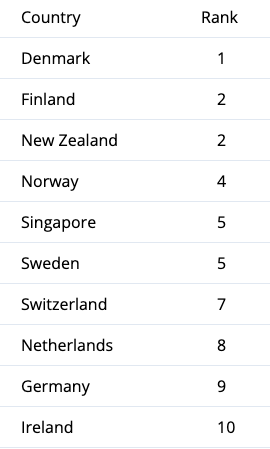The Republic is perceived to be among the least corrupt nations in the world
Transparency International, a non-profit making independent body which monitors government corruption throughout the world, has just issued their latest Corruption Perception Index (CPI) figures, and Ireland makes it into the top ten countries in the world that are perceived to be the least corrupt.
The least corrupt country in the word is perceived to be Denmark, followed Finland (No. 2), New Zealand (No 2=) and Norway (No. 4)
Ireland has steadily crept up the table, from a low of No. 18 and now sits at No. 10.
Over the years, investigations into corruption by bodies such as the Flood Tribunal and the Mahon Tribunal greatly helped the perception of Ireland as a place where business could be carried out without corrupt financial dealing. Tribunals, which began in the 1990s were into into allegations of corrupt payments to politicians regarding political decisions.
In Transparency International's rankings, the UK has fallen seven places to rank 18th representing the biggest fall among the G7 countries. Only five of the 180 countries assessed for the CPI saw their year-on-year scores drop by five or more points: the UK (-5), Qatar (-5), Myanmar (-5), Azerbaijan (-7) and Oman (-8). Transparency International says this is a historic low for the UK.
Hungary replaced Bulgaria as the lowest-ranked EU member state, falling four places to 77th.
South Sudan (13), Syria (13) and Somalia (12), all of which are involved in protracted conflict, remain at the bottom of the CPI.
Corruption — its definition and its deleterious consequences
Transparency International say they define corruption as “the abuse of entrusted power for private gain”.
To gauge a country’s Corruption Perception Index, a raft of parameters are considered. It is worth noting that the CPI is an assessment of perceived corruption in the public sector. It doesn’t look at how countries help facilitate corruption overseas.
The parameters surveyed include the giving of bribes — these include bribes to police, the judiciary, local authorities and many other bodies and individuals. Embezzlement, favouritism in everything from health to housing, and nepotism are all considered. The score of each country is based on data compiled from eight independent sources, including the Economist Intelligence Unit and the World Economic Forum.
Transparency International believes that corruption erodes trust, weakens democracy, hampers economic development and further exacerbates inequality, poverty, social division and the environmental crisis.
Corruption can happen anywhere: in business, government, the courts, the media, and in civil society, as well as across all sectors from health and education to infrastructure and sports.
A perception that a country is corrupt can harm investment and economic success, so it is no surprise that the countries that are perceived to be least corrupt are all countries where the standard of living is high, and which have robust economies.
 Transparency International's top ten countries perceived to be the least corrupt
Transparency International's top ten countries perceived to be the least corrupt
